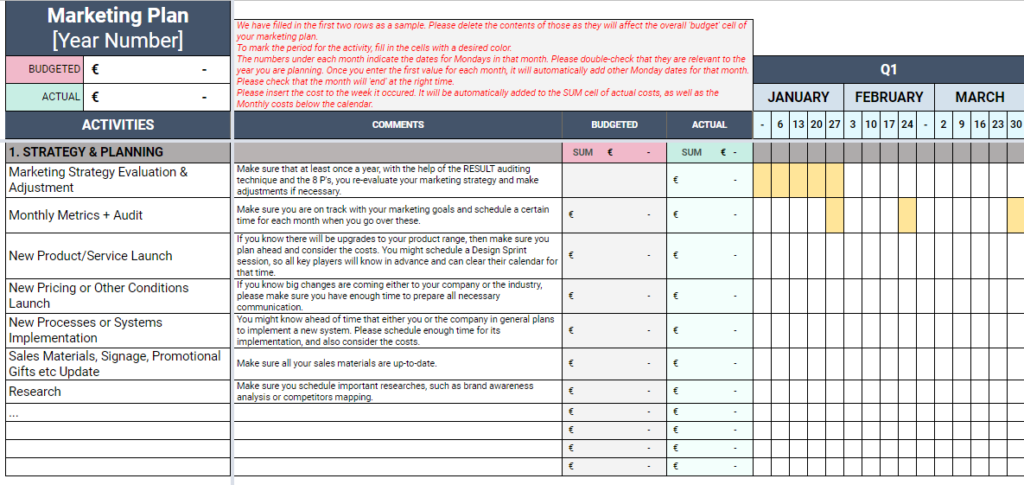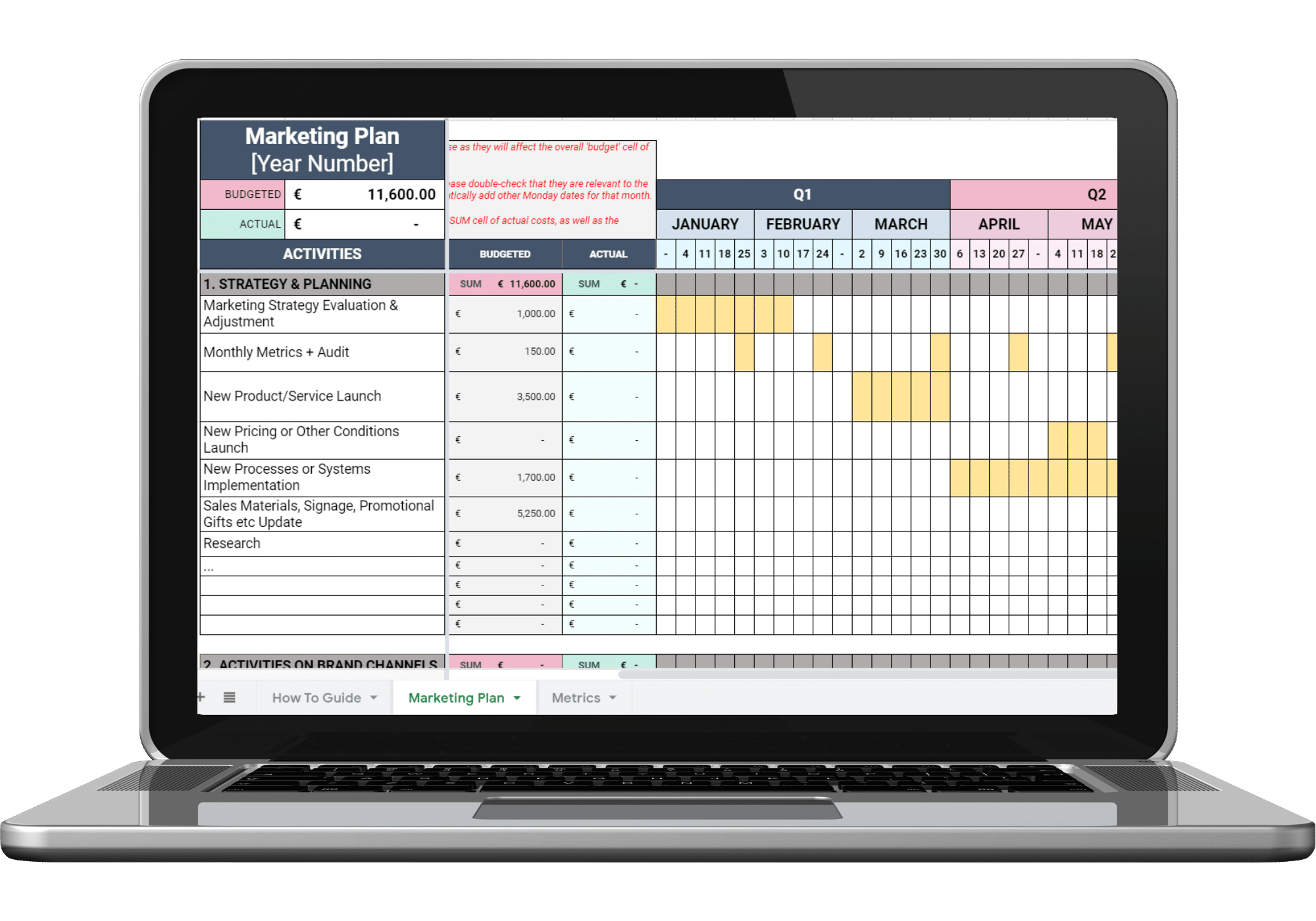Creating a 12-month Marketing Plan can seem like a daunting task, especially if you are constantly overwhelmed by a never-ending stream of urgent tasks, emails, phone calls and notifications. Things seem to change so abruptly in the marketing world, and one may even argue that it is nearly impossible to predict what you need to do in your marketing in 12 months’ time. Let’s discuss the benefits of having a marketing plan and how to create a marketing plan that is actionable, helpful, measurable and goals oriented.
Why should you create a marketing plan?
Ideally, in any business you should know:
- your goals and your long-term vision (what are you hoping to achieve through your marketing activities?)
- your strategy (how are you going to achieve it?)
- your tactical activities that are necessary to implement the strategy (what do I need to do every year, every quarter, every month, every week, and every day?)
However, what can often happen in businesses is one of the following scenarios:
- You know your goals and long-term vision, but you have not really thought about the strategy. So, people in the company keep on doing certain activities and “keeping busy” just because “we have always done things this way”. But in reality, some of those activities may even be counteractive to achieving the business’ goals, or you may end up wasting a lot of resources because without a strategy it is easy to get lost and go with the flow even if the flow is going in the wrong direction.
- There is a strategy on the executive level, but people who need to implement this strategy are not aware of this or do not fully understand this. This is a typical example of miscommunication where executives assume that their employees know what and why needs to be done, however the employees most likely do not have the big picture and without it do not understand the cause-and-effect relations in their daily job.
- There is a strategy and it is widely known across the company, but there is no actionable plan that makes following a strategy achievable. People only do the strategic activities when they “have time” or when they “remember to do them”. However, without consistency and measurability it is very difficult to achieve drastic results.
This is why having and implementing a tactical marketing plan is so crucial:
- When you create a marketing plan, you take the time to focus and decide on the strategy and think through all the tactical activities that are necessary to achieve that strategy. Focus and time are crucial here because it is impossible to come up with a strategy and a tactical plan “on the go”.
- Thanks to a marketing plan, all the key members in the team will know what will happen when and why. If there is a wider awareness of the processes, campaigns, activities and events that are going to happen in the following 12 months, then people can start preparing ahead and can better communicate to the clients, partners, colleagues, etc. what is going to happen.
- Marketing plan tells you exactly what you need to do and when. This will ensure that all the key things you have planned will be done and they won’t just be forgotten. This is the blueprint to achieving your business’ results! Additionally, it works in the retrospect: you can see what you did and when, and then compare it to the results. Most likely, you’ll start to see some patterns there and can make better decisions for the following year.
What should a marketing plan consist of?
All businesses are different and what works for one, may not work for another. However, we believe that most businesses can fit their activities within the following categories:
- Strategy & Planning – When do you work on strategic activities and planning? When do you analyze your metrics and decide with what activities you should continue, and which do not benefit your business at the moment? Always schedule these strategic and analytical tasks and reminders into your plan, so you won’t forget to regularly evaluate your marketing.
- Activities on Brand Channels – You need to make sure that your brand channels are always up-to-date and represent you in the best way possible. This includes your social media channels, your blog, newsletters, website, physical location, etc.
- Client Service & PR – Do you work on your reputation? How can you build a positive brand image? For example, you could plan regular PR activities to make sure your brand remains on top of people’s minds.
- Paid Media Campaigns – Plan all the advertising activities, such as product campaigns, seasonal discounts, always-on Google Ads and Social Media Ads, etc.
- Subscriptions – Apart of the marketing budget always goes to using different services or products to either automate your activities or to gain better reporting opportunities or to allocate tasks within a team. Don’t forget to add the cost of the subscription to such softwares.
- Partnerships – There are always other businesses that are connected to yours. For example, you may create joint campaigns or events, and it’s important to maintain those partnerships. Another thing to remember here is that if you belong to any type of association, e.g. The Chamber of Commerce, then you need to take into consideration the membership fee as well.
- Events – This may include participation in fairs or conferences, or also VIP events created for your best customers or service providers.
- Employer Marketing – You need to always work on inward marketing as well. Your employees should be proud and happy to work with you. Regularly work on motivating your team, either with team events or a team reward system or by celebrating their birthdays or work anniversaries.
- Other – There may be odd activities here and there that do not seem to fit under any of the categories (e.g. Ordering promotional items).
PS! Make sure you also add budgets to all the activities, so that you can predict your marketing costs per each month and per each category. As you implement the tactical plan, remember to add the actual costs next to the budget so that you can always keep track of how much you have spent compared to the budget, and this will also give you information on how to better budget next year.

A powerful strategy is about consistently incorporating the right actions so that it becomes a natural process. This is your chance to deliberately decide where your energy, time and money will go in your job, so that you don’t have to feel like a rat in a wheel, always running, but not getting anywhere.
“Strategy without process is little more than a wish list.”
Robert Filek
You may have the most amazing idea and even some type of plan to get there, but without tactical activities and consistency it is merely impossible to reach your goals within the desired timeframe. Make a commitment to yourself to take time to focus and create a marketing plan. Schedule a time for it in the calendar and don’t procrastinate. Just do it, and you’ll soon see how much simpler your daily life gets, and how much easier it becomes to make decisions about your marketing activities!
PS! If you're looking for a framework to build your marketing strategy and a comprehensive template for your marketing plan and budget, then check out our Strategy Building Tool & 12 Month Marketing Plan.

